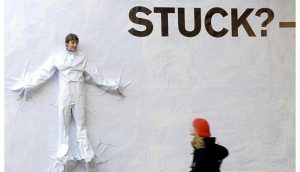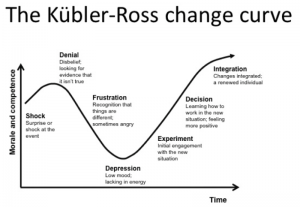Coping with change
A couple of weeks back on a coaching call, my client related a lovely story that she had shared with some of her school children and I want to share it with you.
A monkey was walking through the Jungle, when it came upon a hole in the ground. When he looked into the hole he saw a juicy ripe Marula fruit at the bottom of the hole. The sides of the hole were quite narrow and it took a little while to wriggle his hand down into the hole far enough to reach the fruit. At last he grabbed onto it and when he tried to withdraw his hand, he found that he couldn’t because his clenched fist prevented him from being able to extract his hand along with the Marula fruit.
He struggled for ages to get his hand out. Eventually a passing porcupine stopped and asked him, “Why do you have your hand down that hole?” – “Are you stuck?” The monkey explained he had spotted the Marula fruit and how he had grasped it, but now he was unable to remove his hand whilst holding the fruit. The porcupine thought for a minute and then asked the monkey, “What else is there around you that could help you get what you want?”
The monkey looked around and suddenly realised the whole forest floor was littered with Marula fruits in abundance, just there for the taking. Because he had been so focused on the one in the hole, he had completely missed all the other opportunities.
True to life?
How true to life is this? How many people do you know who cling desperately to outmoded thinking like survivors cling to the flotsam of a sinking ship?
In her book Death and Dying published in 1969, Elizabeth Kubler-Ross produced a model which has subsequently been found to be useful in the majority of situations relating to change. According to Kubler-Ross, there are FIVE distinct stages, Denial, Anger, Bargaining, Depression and Acceptance and these are transferable and can vary in intensity from person to person.
Real example
Following a bit of research on the internet, I found a great example in a grief web-site – thank you Windstream.net.
Imagine you are late for work, you rush out of the house get in the car, drop your keys, curse as you fumble for them, insert the key and turn it and ….. whhaa whaaaa whhaaaahh –
The battery is flat!
- DENIAL— What’s the first thing you do? You try to start it again! And again. You may check to make sure the radio, heater, lights, etc. are off and then…, well, you try again!
- ANGER — “%$@^##& car!”, “I should have junked you years ago.” You slam your hand on the steering wheel and shout. “I should just leave you out in the rain and let you rust.”
- BARGAINING— (realizing that you’re going to be late for work)…, “Oh please car, if you will just start ONE MORE TIME I promise I’ll buy you a brand new battery, get a tune up, new tires, belts and hoses, and keep you in perfect working condition….please start..”
- DEPRESSION— “Oh God, what am I going to do? I’m going to be late for work. I give up. My job is at risk and I don’t really care anymore. What’s the use?”
- ACCEPTANCE — “Ok. It’s dead. Guess I had better call the garage guy or find another way to work. Time to get on with my day; I’ll deal with this later.”
This is not a trivial example. We often all go through this process several times a day. A dead battery, the loss of a parking space, a wrong number, the friend who doesn’t pick up your call, a job you missed, an overdrawn bank account, supermarkets out of stock of your favourite muffins or the cashier close just as you get to them!
Sometimes (more often than you would think), people get stuck like the monkey, holding onto a precious item that prevents them from moving forwards, like the old girl down the way who refuses to have a mobile phone, a hearing aid or glasses because she doesn’t like ‘em or the way they make her look.
Like the porcupine in our story, Coaches are trained to ask deep pertinent questions that empower people to reflect and seek alternative views of their current situation. They help people to focus on fixing the things they can fix and not on things they cannot!
I was moaning about the state of the educational system and the flagrant inequities that exist between universities based in the East and the West when my Mentor Coach, Dr. Clare Beckett McInroy, stopped me and asked, “Mike, it appears to me that you have two choices; either you can expend more energy moaning about the problem as you see it; or you can do something to fix it!, Which one is it going to be?”
This is why I am a coach, because like Dr. Clare, I am about solving problems for people.
One last thing, please don’t just call me if your car battery is flat or you find a monkey with his hand down a hole – okay?
Who employs a coach? Winners do!!
Likes are nice, Shares are better, Comments are best!


